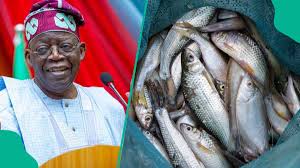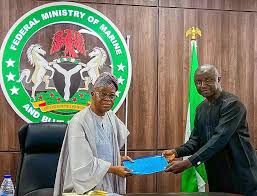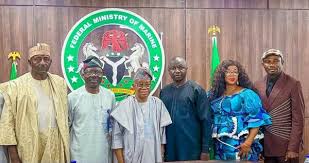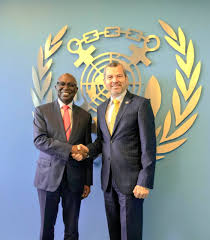By Stephen Ubanna
More facts have emerged why the Nigerian Government has set the necessary machinery in motion to end the importation of fish to save the country’s scarce foreign exchange reserves and promote local fish production to meet local demand and export the excess.
Reports from the Central Bank of Nigeria, CBN, under the close of Michael Olujimi Cardoso, shows that the Federal Government spends closely to the North American country of the United States, $1.2 billion annually to import fish.
That much was confirmed by Adegboyega Oyetola, a former governor of Osun state and now minister of marine and blue economy going by the amount that was spent by the Nigerian Government to import fish in 2024, alone, which was put at US $1.2 billion.
A determined Oyetola who is out to end Nigeria’s dependence on fish importation appears to be aggressively making all the necessary efforts that would aggressively boost local fish production to ensure that Nigeria earns at least US $1.5 billion from fish exports to other parts of the world, particular, the West and Central African subregional markets.
Signs that that Nigeria is on the road of achieving emerged when the Department of Fisheries and Agriculture and Nigerian Institute of Oceanography and Marine Research, NIOMR, of the Federal ministry of Agriculture and Rural Development was moved to the newly created ministry of marine and blue economy in August 2023 by President Bola Ahmed Tinubu as part of efforts to boost the nation’s local fishing to meet local demand and export to earn additional forex to compliment crude oil export revenue on a yearly basis.
The ministry, through the Department of Fisheries and Agriculture and NIOMR, according to the minister, had already performed the capacity assessment of the existing trawlers, cold rooms, storage infrastructure and processing infrastructure available in the country.
It was said to have also carried out stock assessment and marine mapping on a historic basis and was said to have moved a step further to further consolidate the nation’s data into fisheries information Management System , in order to provide all investors clarity as the ministry was said to have developed IPMS, in line with the one-stop approach that would house statistics , licensing,, import and import information, regular fisheries source estimation by the Nigerian Institute of Oceanography and Marine Research, NIOMR.

As a prelude to ensuring that NIOMR, which is a multidisciplinary Institute which carries out research activities appear to have been well-positioned to execute their Constitutional mandate. These includes research on aquaculture, biological oceanography, fisheries resources, fish technology, and product development, physical and chemical oceanography, marine geology/ geophysics, marine culture, marine technology and safety, which was said to have given a boost to local fishing in the recent time.
, Already, the newly established ministry of marine and blue economy was had moved to equipped the Institute with the necessary resources required to enhance its research capabilities over the last two years, re-introduced regulation to govern artisanal and marine fishing, fishing gear regulations, protect areas of fishing in Nigerian waters against foreign fishermen encroachment.
The ministry was said to have also moved a step further to X-ray the size and age restrictions of the protected areas in Nigerian maritime domain, seasonal restrictions, Bye Catch, Safe and Safe processing of seafood to meet global requirements and Monitoring and Enforcement, which many believes are yielding results.
Speaking at a recent high-level Consultative meeting with fisheries Cooperative Groups in Abuja, the Federal Capital Territory, FCT, the former Osun state governor who had outlined a bold vision aimed at’’ transforming the nation’s Agricultural sector into a powerhouse of food security, export competitive and major employers of Labour to absorb the teeming unemployed Youths in the country’’.
The minister was emphatic: Nigeria must chart a new course towards self – sufficiency in fish production, stressing that the ministry under his Leadership, with the support of President Tinubu, will do everything within its powers ‘’to support the fisheries and aquaculture sector of the economy through bold policy thrust, technical support and financial inclusion’’.
He may have emboldened the various fisheries cooperatives across the country to sit up and outshine the foreign fishermen particular, those from the Asian country of China and France, which had colonized 22 African countries but had had reduced to let go of their mineral resources.
Take for instance, French fishing vessels operate n Gabonese waters as part a Sustainable Fisheries Partnership Agreement, SFPA, between the European and Gabon. The situation in Gabon and other African countries is not different from what had been happening in Nigerian waters since independence.
There are indications that foreign fishing vessels, particular, trawlers have been engaging in illegal fishing activities within Nigerian waters. These illegal fishing activities, The Value News online Magazine was informed include fishing within prohibited zones, causing illegal fishing gear and overfishing, leading to depletion of stocks and damage to Nigeria ecosystem.
Past ministers of Transportation who had superintended the nation’s maritime industry had failed to tail attention to address the problem but minster Oytola, who is not ready to play along like the other former ministers of Transportation but had remained focused because the new ministry of marine and blue economy is doing what it has been mandated to do by President Tinubu: reduce the involvement of the foreign fishermen who had dominated the nation’s fishing sector over the years to pave way for the local fishermen to take over.
It was not surprising why the minister had told the Consultative meeting of fishing cooperatives that that Nigerian fishermen must scale up domestic fish production, ‘’to ensure that the country reduce dependency on imports reposition the sector for sustainable growth’’.

Some of the Fisheries cooperative societies tat were said to have attended the all-important meeting includes Fisheries Cooperative Federation of Nigeria, FCFN, Tilapia Aquaculture Developers Association of Nigeria, TADAN, Catfish Farmers Association of Nigeria, CAFAN, Women in Fish Farming and Aquaculture, and the Practising Farmers Association of Nigeria.
Minister Oyetola may have gladdened the heart of the fish farmers, when he disclosed that the ministry, under his leadership, is intensifying efforts ‘’to support women and youth in farming sector’’, stating that ‘’the start start-up grants and other empowerment initiatives are already in the pipeline’’, which he had said aligns with the present Administration ‘s Renewed Hope Agenda. The Rewed Hope Agenda, he had said prioritises youth engagement and economic diversification, which the ministry of marine and blue economy has followed to its logical conclusion.
The Osun state born politician had sounded it loud and clear that ‘’increasing youth participation in aquaculture is not only vital for food production but also a strategic resolution to reducing unemployment’’.
Informed sources had told the online Magazine that participants at the Abuja interactive session organized by the ministry of marine and blue economy had raised a wide range of pressing challenges currently facing the sector and why they could compete with the foreign shippers, who have the trawlers to enter deep into the ocean to fish.

They were said to have cited ‘’overfishing, environmental degradation, lack of access to affordable finance, post-harvest loses, inadequate storage infrastructure, poor transportation and market linages and low youth empowerment’’.
This is in addition ‘’to problems of multiple taxation by local Government Authorities, and the rising cost of imported fish feed’’, which participants had described as very discouraging.
The minister, who appears to be acting out a script, may have gladdened the heart of the local fish farmers when he gave strong assurances that the ministry is already engaging stakeholders, both local and foreign, ‘’ to tackle the identifies issues head-on’’.
As part of efforts to address the financial challenges of the local fish farmer, minister Oyetola, had revealed that discussions are ongoing with the World Bank to secure financial support for Catfish farmers and that the ministry would be collaborating as well with the Nigerian Agricultural Insurance Cooperation, NAIC, to ensure affordable and accessible insurance coverage for fish farmers across the 36 states of the Federation and the FCT.
The minister, had confirmed that the ministry is in talks with officials of the ministry of Water Resources to replicate the successful aquaculture model at the Oyan Dam in other parts of the country, pointing ‘’to the integrated planning and inter-ministerial cooperation as key pillars of the strategy’’.
Olufemi Oloruntola, the ministry Permanent Secretary who was said to have delivered the opening speech during the interactive session with the various fish cooperative groups at the FCT, noted that the meeting with the fish farmers was in fulfilment of commitments that had earlier been made by the minister during the ministry’s second quarter citizens and stakeholders’ engagement in Lagos, the nation’s commercial nerve center on July 3, 2025.
He was said to have pointed out the ministry’s readiness to build enduring partnerships with cooperative societies to drive inclusive growth of the economy. Welington Omaragbon, Director of Fisheries and aquaculture, was said to have highlighted ‘’the importance of strengthening institutional frameworks and adopting enterprise-driven models to enhance productivity and attract funding’’.
Notwithstanding the challenges currently being faced by the Fish Farmers across the country, participants at the interactive session with the ministry of marine and blue economy officials led by minister Oyetola, had praised the old initiative, describing it as ‘’timely and overdue’’, stating that the consultative approach that has been adopted by the minister Oyetola would achieve the desired results.
Bola Akinola, Media Aide to the minister had described the minister’s integrative session with the various Farmer Groups as ‘’robust, frank, and had ended with optimism about Nigeria ‘s potential of becoming self-sufficient in fish production and a net exporter of fish in the near future’’.







